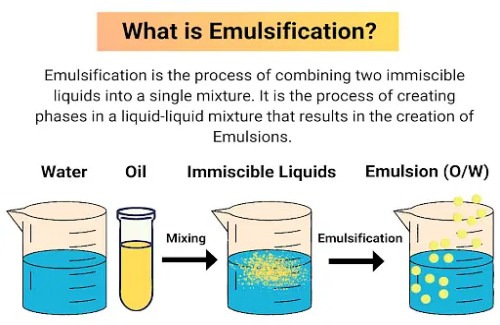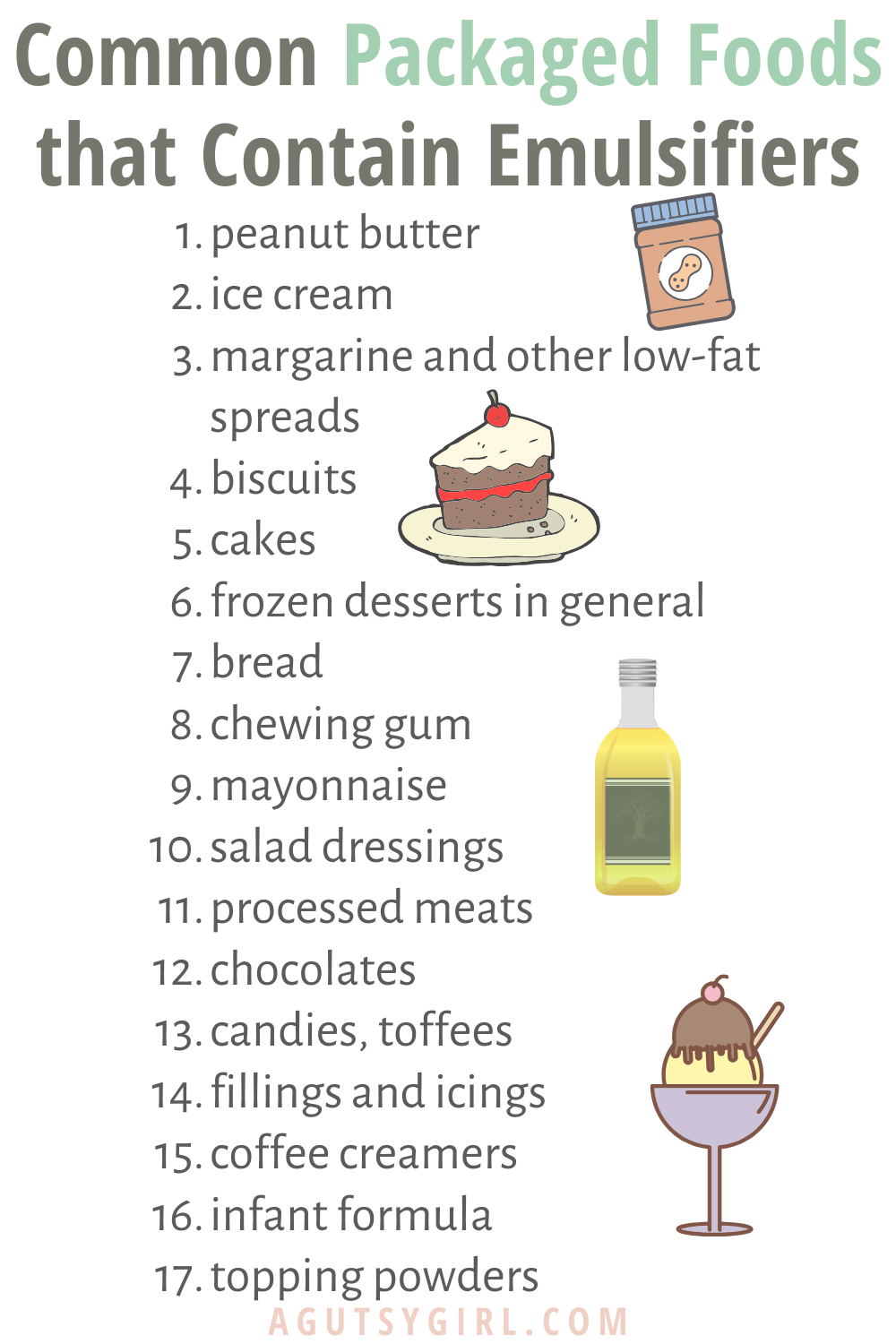The Science Behind Emulsifiers and Their Importance in Modern Production
Emulsifiers play an important role in modern-day manufacturing, acting as the unhonored heroes that mix oil and water for a wide array of products. As customer preferences change in the direction of cleaner labels, the need for ingenious emulsifiers is growing.
What Are Emulsifiers?
Emulsifiers are crucial agents in the globe of food and item manufacturing, acting as the adhesive that binds 2 otherwise immiscible fluids, like oil and water. Typical instances include lecithin discovered in egg yolks and soybeans, and mono- and diglycerides made use of in various refined foods.

When you whip up a salad clothing or delight in a velvety treat, emulsifiers assist keep that perfect texture. Without emulsifiers, numerous foods would separate, leading to undesirable textures and flavors.
The Chemistry of Emulsification
When you mix oil and water, you might notice they do not mix conveniently; that's where the chemistry of emulsification enters play. Emulsification takes place when small droplets of one liquid disperse in another, creating a stable combination. This happens due to the fact that oil and water are immiscible because of their differing polarities-- water is polar while oil is non-polar. To overcome this challenge, emulsifiers are used.
These particles have a hydrophilic (water-attracting) head and a hydrophobic (water-repelling) tail. When you include an emulsifier, its molecules position themselves at the oil-water user interface, minimizing surface tension and permitting the beads to mix. The emulsifier creates a safety layer around each droplet, preventing them from integrating back into different layers. Recognizing this chemistry is crucial for achieving security in items like dressings, creams, and sauces, making emulsification essential in modern-day manufacturing.
Kinds of Emulsifiers
Numerous types of emulsifiers play crucial roles in supporting mixtures of oil and water. Natural emulsifiers, like lecithin from egg yolks or soy, are acquired from plants and animals, making them prominent in food items.
On the other hand, synthetic emulsifiers, such as mono- and diglycerides, are chemically crafted to boost stability and life span. They're generally used in refined foods and aesthetic items.
Additionally, you may encounter non-ionic, anionic, and cationic emulsifiers, each with distinct properties that affect their performance. Non-ionic emulsifiers, as an example, job well in a vast array of pH levels, while anionic emulsifiers often tend to perform much better in alkaline conditions. Recognizing these kinds can aid you choose the best emulsifier for your certain application.
Devices of Solution Development
Understanding how emulsions develop is necessary for developing secure mixtures of oil and water. Emulsions occur when you disperse tiny droplets of one liquid into another immiscible liquid, such as oil in water. This process requires energy, typically supplied with anxiety or mixing. When you introduce an emulsifier, it decreases the surface tension between both fluids, permitting them to blend even more quickly.
The emulsifier particles have a hydrophilic (water-attracting) head and a hydrophobic (oil-attracting) tail. When you include an emulsifier, these molecules arrange themselves at the oil-water user interface. The hydrophilic heads communicate with water, while the hydrophobic tails anchor right into the oil. This produces a barrier that maintains the droplets, stopping them from integrating.
Applications of Emulsifiers in Different Industries
Emulsifiers play a vital function across numerous industries, making your favored foods smoother and a lot more enjoyable. In cosmetics, they boost product appearance and stability, ensuring a pleasurable application experience. Plus, in drugs, they help provide important active ingredients efficiently, boosting overall efficiency.
Food Industry Utilizes
While you might not recognize it, emulsifiers play a vital function in the food market, improving the texture, stability, and rack life of numerous items. In baked goods, emulsifiers improve dough handling and retain moisture, resulting in a better texture and extended freshness. By ensuring harmony and top quality, emulsifiers are substantial to supplying the scrumptious items you appreciate every day, making them a crucial active ingredient in modern-day food production.
Cosmetic Formulas Benefits
When it comes to aesthetic solutions, emulsifiers are crucial for producing products that feel luxurious and execute properly. They assist blend oil and water, ensuring a smooth and secure uniformity in creams, creams, and lotions. You'll discover that emulsifiers enhance item security, avoiding separation and lengthening shelf life. This means you can appreciate your preferred moisturizer without fretting about it spoiling also swiftly. Additionally, emulsifiers improve the application experience, permitting also distribution and far better absorption right into the skin. By utilizing emulsifiers, you also accomplish a more enticing texture, making your cosmetics really feel wonderful this article on your skin. Overall, emulsifiers play a crucial role in supplying premium cosmetic items that satisfy your elegance requirements.
Pharmaceutical Applications Review
In the pharmaceutical industry, emulsifiers are necessary for creating effective medicines. They aid create stable blends of oil and water, making certain that active ingredients are uniformly distributed and quickly soaked up by the body. You'll find emulsifiers in various dosage types, like lotions, lotions, and fluid suspensions, boosting the bioavailability of drugs. They also enhance the structure and security of items, making them extra enticing and easier to utilize.
The Impact of Emulsifiers on Item Top Quality

By guaranteeing try these out steady emulsions, you minimize the danger of spoilage and extend shelf life, ultimately saving you money and time. You'll likewise discover that emulsifiers can enhance the bioavailability of active ingredients in your products, making them much more efficient for consumers.
Furthermore, they enable you to produce ingenious formulas that meet diverse consumer demands. Whether you're crafting a luscious clothing or a luxurious cream, emulsifiers are essential for attaining the wanted outcomes. In brief, by understanding and leveraging the impact of emulsifiers, you can considerably raise the quality of your products.
Future Fads in Emulsifier Growth
As the need for cleaner labels and lasting items increases, the development of brand-new emulsifiers is established to progress considerably. You'll notice a change in the Read Full Article direction of plant-based and natural emulsifiers, driven by customer choices for components that are eco-friendly and less processed. Advancements in biotechnology will likely improve the performance and efficiency of these emulsifiers, permitting makers to create secure formulas with fewer ingredients.
You might additionally see a boost in multifunctional emulsifiers that not only support emulsions yet likewise boost flavor, appearance, or dietary worth. This pattern could streamline ingredient checklists while improving item performance.
In addition, with advancements in nanotechnology, emulsifiers can be engineered at the molecular degree to achieve extraordinary stability and performance. Emulsifiers. As you explore these patterns, you'll find that the future of emulsifier advancement is not nearly capability, but likewise about accepting sustainability and openness in ingredients
Often Asked Inquiries
Are Emulsifiers Safe for Consumption in Food Products?
Yes, emulsifiers are normally safe for usage in food. They've been extensively examined and accepted by food safety authorities, so you can appreciate your favored foods without fretting about their influence on your health.
Can Emulsifiers Be Derived From Natural Resources?
Yes, you can obtain emulsifiers from all-natural resources. Ingredients like lecithin from egg yolks or soybeans and casein from milk prevail. These all-natural emulsifiers aid maintain mixes without synthetic ingredients, making them preferred in numerous products.

How Do Emulsifiers Impact Service Life of Products?
Emulsifiers support combinations, stopping splitting up and putridity - Emulsifiers. By keeping uniformity, they prolong items' life span, making sure quality and quality. You'll observe that emulsifiers help keep your favored foods and cosmetics performing well over time
What Are Possible Side Effects of Emulsifiers?
You may experience digestive system issues when consuming products with emulsifiers, as they can interfere with intestine bacteria. Some research studies recommend possible links to inflammation or allergies, yet more research is needed to completely recognize these results.

Are There Alternatives to Typical Emulsifiers?
Yes, there are options to traditional emulsifiers. You can discover choices like natural gum tissues, starches, or lecithin. Each alternative deals unique properties, so experiment to discover what jobs best for your particular application.
 Ralph Macchio Then & Now!
Ralph Macchio Then & Now! Ariana Richards Then & Now!
Ariana Richards Then & Now! Talia Balsam Then & Now!
Talia Balsam Then & Now! Lucy Lawless Then & Now!
Lucy Lawless Then & Now! Jaclyn Smith Then & Now!
Jaclyn Smith Then & Now!